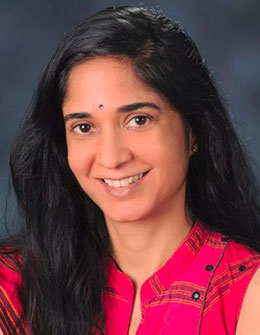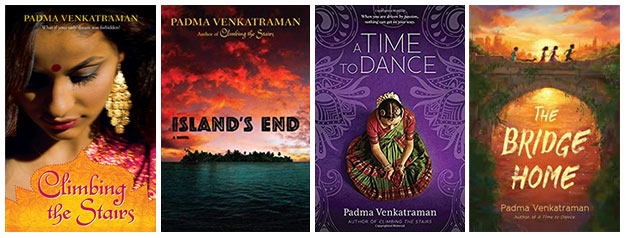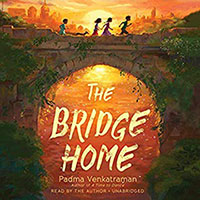
“The woman who read Climbing the Stairs aloud did a great job,” my friend said. She was telling me, with delight, how her children and their friends — two girls and two boys — listened with rapt attention to the audio book version of my debut novel, refusing to get out of the car when the trip ended but the story hadn’t yet.
Delighted though I was to hear both how much the young people enjoyed the audiobook, I feel a twinge of disappointment. After all, I love reading books aloud — and I tend to think I do a pretty good job of it — and I was never offered the chance to read my own novel for the audiobook version.
An entire decade’s flown by since Climbing the Stairs was released. It’s still in print, which is a wonderful achievement. It’s also no longer my only novel. During this decade, Island’s End and A Time to Dance were also published. And, as I had a baby and spent vast and wonderful amounts of time reading to her and watching her read, I didn’t have a spare moment to consider doing the audio for either of those novels.
Then, just a few months ago, Penguin contacted me to say the audio book version of The Bridge Home would be released simultaneously with the print version, in February 2019. I was thrilled to hear this — and when I mentioned this to my family at the dinner table, my daughter promptly asked if I would be reading it aloud.

“No,” I said. “They’ll get a professional actress to read it aloud.”
“But you read so well!” Hearing the disappointment in her tone revived that sense of disappointment I’d felt all those years ago.
And, I wanted, just as much as ever, to read my own work aloud. I’d had ten years of reading books aloud every night. Surely I was better at it, not worse?
“What’s the worst they could say,” my spouse said. “No?”
He was right about that. But I wanted the best for my audiobook. I didn’t want to make a complete hash of reading it aloud.
Publishers have many excellent reasons for employing professional actors to read books aloud (rather than authors). Some authors do their work a disservice when they read it aloud. And even those who read aloud well aren’t professional actors. We don’t learn how to “do different voices” and we work with editors, not directors. Reading hundreds of pages at one stretch is not the same as reading aloud to an engaged and eager audience for ten whole minutes. The art of the spoken word is not the same as the art of the written word. Being a good writer doesn’t imply one has any acting capability, let alone talent.
I thought it over, and then decided I’d regret it if I didn’t give it a chance. So, I asked Penguin for permission to audition for the audiobook (and yes, authors do have to audition to read their own books aloud which is in their own best interest). The audio book publisher was kind enough to give me permission to send a seven-minute (or so) audio clip. I was instructed to read a section that contained dialogue.
My daughter was delighted. She insisted on sitting right next to me as I recorded my audition.
That’s when I had my first inkling of how hard the process would be.
When I read aloud, I often make mistakes — but I gloss over those mistakes. I change the sentence I’m reading if necessary, so it’s grammatically correct. I’m not good at reading precisely what’s on the page — although this is, of course, what one needs to do when reading a middle grade book aloud.
After trying three times and discovering the third time isn’t any more “the charm” than the first two, I was ready to give up. My daughter, however, wasn’t ready to give up on me.
And given that I hope she’ll be persistent and that I want to lead by example, I forced myself to read a fourth and finally a fifth time. That fifth time I almost made it all the way through three pages without a single error. Or maybe two and a half.
So I sent off my audition tape and waited.
In a day or two, I had a warm reply from the publisher. She described my audition as “lovely” and said she was happy to have me read, or to have a professional read. She sent me links to two marvelous readers whom she had in mind. After listening to other audio books those two actresses had read, I was more confused than ever.
I sent a long letter to the publisher, expressing my dilemma. I loved audiobooks and I had spoken seriously to the Perkins Institute about volunteering to read books aloud for them. I always dreamed of reading my own novel, some day — at least one of my novels. But then, I wanted the best possible reader to read it aloud — and I couldn’t tell if that person was me.
“Let’s talk,” the publisher said.
I called and left a long and worried message on her answering machine.
When she called back, she was enthusiastic. “I listened to your message a couple of times,” she said.
Really? I’m not even sure my spouse listened to any message I left him a couple of times. Nor, for that matter, although I love his voice, have I ever listened to his messages repeatedly.
She said she’d also watched the links of my interviews on national and international TV and radio.
I was thrilled. At least someone was actually listening to those links which had taken my Luddite self years to load onto my website.
Based on all this, she said, she was willing to give me a chance. “It’s your fourth novel. You’ve earned it.” She assured me she wanted the best for the book too, and I could tell she really did, just as much if not more, than I did.
 A mixture of triumph and trepidation filled me, as I entered the recording studio, about a week later. It wasn’t really any different from a booth at a radio station, as far as I could tell. And it was far less forbidding than a TV set. Yet my hands were trembling as I got into “the saddle” and put on my headphones.
A mixture of triumph and trepidation filled me, as I entered the recording studio, about a week later. It wasn’t really any different from a booth at a radio station, as far as I could tell. And it was far less forbidding than a TV set. Yet my hands were trembling as I got into “the saddle” and put on my headphones.
For the next two days — two whole days — I read and re-read and read. A director supervised my work and he was brilliant.
His words of wisdom: “If you get tired, if your mind starts wandering, take a short break and then come right back and attack it with all your energy and concentration. Don’t give me a half-assed performance. Read like you mean every word. An author — in this case you — spent years working on it. And I always tell my actors, I don’t care how they feel, they owe it to the author to give it everything they’ve got. You owe it to yourself.”
Or, I thought, I owed it to my characters. I loved the four characters in The Bridge Home. They are real to me, now, and I want the best for them. I want them to be loved. I want their story to be loved.
At some point during the writing process, I read an entire novel aloud — but when I do that, I’m listening and paying attention in a different way. I use those readings to help me refine and edit my drafts.
 Reading aloud for the audiobook was very different. It was far more strenuous. I had to “get into character” — every character in the book, really. It’s what I do anyway, when I write, but in this case, I had to speak in character instead of just listening to my characters speak and writing down the words they said in my head.
Reading aloud for the audiobook was very different. It was far more strenuous. I had to “get into character” — every character in the book, really. It’s what I do anyway, when I write, but in this case, I had to speak in character instead of just listening to my characters speak and writing down the words they said in my head.
“Don’t worry about getting the words right,” my director said. “Everyone makes mistakes, and everyone has to come back to make corrections later.” Those corrections are what the industry calls pick-ups.
What I needed to do was read in such a way that the listener hears just enough emotion to stay engaged. Too much turns listeners off, and too little leaves them bored. That’s not unlike writing — as a writer, I’ve always maintained that it’s not just what I say and how I say it, it’s also what I leave out.
My director’s golden words of wisdom helped me understand this fine balance as I read aloud “You don’t need to act the writer’s words. You just need to feel the words as you read.”
When I began to see a movie in my head, the way I do when I’m close to completing a novel, I realized that I was in business. And after a few trials, I was in the zone — a sort of waking dream in which I sensed the characters haunting my mind and taking over my heart. And I stayed in that zone as my voice was recorded, allowing the characters to possess my soul, so I was with them during every step of the journey, from the first page to the last.
When I finally took off the headphones and slid off the high stool on which I’d perched as I read and walked out of the recording booth, the owner of the recording studio declared, “You’re the real thing. I almost cried.”
“Thanks,” I said.
 Then he added, gruffly, “The only reason it’s almost instead of actually crying is because I’m an old white man and we weren’t allowed to do that.”
Then he added, gruffly, “The only reason it’s almost instead of actually crying is because I’m an old white man and we weren’t allowed to do that.”
That evening, I get home exhausted and exhilarated, in equal measure.
Will I read all my future books, my spouse and daughter wanted to know when I returned. I wasn’t sure.
I’m still not sure.
But what I am sure of is that I’m glad I did it for The Bridge Home.

I loved hearing about this! Thank you for sharing!
Your story, on telling a story and sharing it with your voice, was both engaging and evocative. I can hardly wait to tell my own stories in such a way — the essence of what an interpreter does. Thank you.